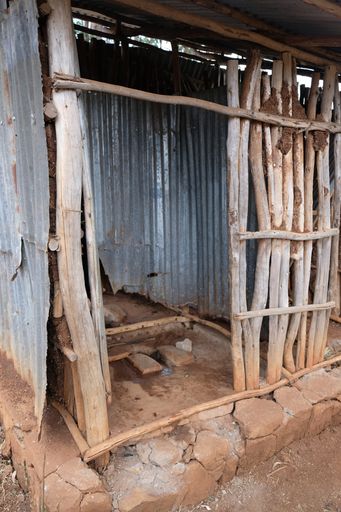Ethiopia
Bilaa – Sanitation Project
Background
Bilaa is located in a poorly developed and poverty-stricken region of western Ethiopia. As people here are struggling for bare survival, they cannot finance a basic infrastructure with sanitation and hygiene facilities from their own resources. In the local schools, simple privies were built from unprocessed wood. These toilet facilities last less than three years and are unhygienic even when new. The students then defecate somewhere in the vicinity of the school.
The lack of adequate sanitation and hygiene facilities affects the health of students and teachers, disrupts the learning environment and leads to a significant number of school dropouts, especially among girls. With the onset of puberty, girls are also confronted with menstrual hygiene. Due to unhygienic toilets that cannot be locked, inadequate hand washing facilities without soap as well as lack of sanitary pads, girls usually stay away from school during their periods. The lack of handwashing basins and soap also increases the spread of diseases. In general, the level of knowledge on hygiene issues is very low among both teachers and students. The village community as a whole has little knowledge of hygiene and limited access to hygiene utensils such as soap and menstrual pads.
Project location
The site is located in western Ethiopia in the town of Bilaa (Oromia region). About 7600 people live in Bilaa. During the school year, which lasts nine months, many students from neighbouring villages come to Bilaa, so that a total of 10700 people are in Bilaa every day. There is also a large weekly market which attracts many people from other towns.
Project beneficiaries
The largest direct target group are the 4806 school children and 130 teachers of the primary and secondary schools in Bilaa, as well as 1900 villagers who participate in the workshops on soap making and menstrual hygiene. The hand washing stations in Bilaa are available to all of the approximately 10,000 villagers. Through the awareness raising activities of the EDA-E staff and students, a large number of residents and weekly market visitors are reached, who can also increase their knowledge about WASH issues.
Project activities
The Corona pandemic has brought the importance of good hygiene for health even more to the fore. This is where the project comes in: permanent sanitary toilet facilities for pupils and teachers are being built. A separate block for girls’ toilets will ensure their privacy, and all girls’ and women’s toilets will be equipped with a container for the disposal of menstrual products. Project activities include:
- Construction of 64 toilets as well as 18 urinals and 68 hand washing facilities in two schools in Bilaa as a prerequisite for good hygiene practices.
- Establishment of self-organised hygiene and sanitation clubs at both schools
- Conducting more than 150 workshops on hygiene practices for the school and village
- Practical training on making soap, reusable menstrual pads to build home know-how for good hygiene practices
- Installation of 20 community hand washing stations at central locations in the village
- Establishment of local hygiene committees to ensure the sustainability of the interventions
Project objective
Good hygiene can be “contagious”. The project hopes that the improved hygiene standards in the schools will serve as a model for the entire village community and that the new practices will spread on a large scale, thus reducing infections and diseases overall.
Local partner organisation
The implementing organisation Environmentalists Development Association – Ethiopia (EDA-E) was founded in 2006 by experts with extensive experience in rural development. EDA-E operates as an independent, government-registered non-profit organisation with a wide range of professional experience in engineering, soil and water conservation, management and finance, and accounting. It has provided access to safe drinking water and improved sanitation for over 50000 people in the central west and south of Ethiopia, bringing about further positive change.
Funders
BMZ
Oswald Foundation
Wilo Foundation
Archbishopric of Munich
Archdiocese of Bamberg
Individual donations
Costs
326,747 Euro
